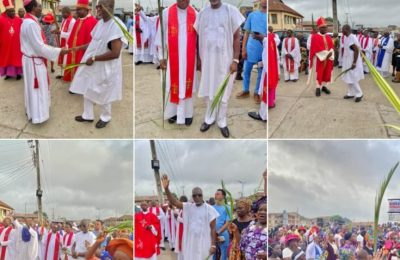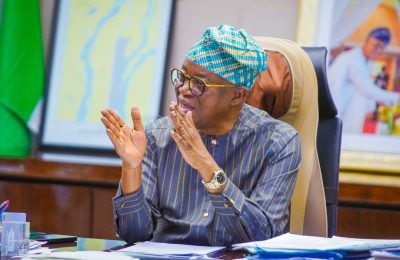
…….Can Protest Solve the Problem?

By: Abdullahi A. Tadese
The protests in Nigeria reflect a mix of public sentiment, some of which is driven by genuine concerns, while others seem fueled by misinformation or misplaced expectations. As Nigerians express their frustrations, it is crucial to examine the broader context of President Bola Ahmed Tinubu’s policies and the rebuilding process he is steering for the nation.
There is no misconception that protest is a fundamental democratic right. In a vibrant democracy like Nigeria, it is essential that citizens have the freedom to voice their concerns. However, it is equally important to ensure that such protests are based on facts and a clear understanding of the policies being contested. Misinformation can often lead to unnecessary unrest, which can hinder the progress that the country so desperately needs. Let’s ask ourselves: “Can protest solve the problem?” “Did the problems start with this present administration of Bola Ahmed Tinubu?” Answers may vary, but understanding the broader context is vital.
While protest is an essential aspect of democracy, it is crucial to recognize that constructive engagement and support for rebuilding efforts may yield better long-term outcomes for the nation instead of destruction. Nigeria has a rich history of civil activism, and citizens have often taken to the streets to express their dissatisfaction with government policies. The current wave of protests can be attributed to several factors, including the removal of subsidies, currency devaluation, rising inflation, and the perceived slow pace of economic reforms.
The removal of fuel subsidies, in particular, has been a contentious issue. While the subsidy had long been a financial burden on the government, its sudden removal led to an immediate spike in fuel prices, triggering widespread discontent. Similarly, the unification of exchange rates, aimed at stabilizing the naira, has been criticized for causing a further decline in the purchasing power of ordinary Nigerians.
National protests have emerged to challenge the government’s policies and decisions. While dissent is a crucial component of a healthy democracy, it is essential to assess the broader context of Nigeria’s rebuilding process and the potential benefits that could arise from President Tinubu’s vision. The reforms undertaken by his administration are not mere cosmetic changes; they are part of a comprehensive strategy to reposition Nigeria for sustainable growth and development.
One of President Tinubu’s key areas of focus has been economic reform. Recognizing the need to diversify Nigeria’s economy away from its heavy dependence on oil, his administration has taken steps to promote agriculture, technology, and manufacturing sectors. The removal of fuel subsidies, although initially met with public outcry, is a strategic move to free up funds for critical infrastructure projects and social welfare programs. Subsidy removal is intended to reduce corruption, increase transparency, and ultimately create a more sustainable economic model.
The implementation of a unified foreign exchange market is another significant reform. This policy aims to attract foreign investment, stabilize the naira, and improve the ease of doing business in Nigeria. While these measures have led to short-term hardships, such as increased inflation and cost of living, they are designed to set the stage for long-term economic stability and growth.
President Tinubu’s administration has also prioritized the strengthening of Nigeria’s institutions. Corruption, inefficiency, and weak governance structures have long plagued the nation, undermining public trust and hindering development. In response, the government has launched initiatives to enhance transparency, accountability, and the rule of law.
While economic and institutional reforms are crucial, President Tinubu’s administration has also shown a commitment to social welfare. The establishment of social investment programs, targeted at the most vulnerable segments of the population, reflects a balanced approach to governance. These programs are designed to alleviate poverty, improve access to education and healthcare, and empower women and youth.
Despite the government’s efforts, including a series of palliatives to each state through the state governors, student loans and pocket money, new minimum wage, increased state allocations, infrastructure projects, reducing the revenue-to-debt ratio from 98% to 63%, making crude oil available in naira for local refineries, removing duties from imported food, commitment to agriculture, and other significant policies, national protests have emerged as a significant challenge to Tinubu’s administration. These protests, driven by dissatisfaction with certain policies, reflect the frustrations of a populace grappling with economic difficulties and political disillusionment. While the right to protest is a fundamental democratic principle, it is crucial that these movements do not undermine the progress being made. The focus should be on finding common ground and working together towards the shared goal of national development, not on destruction and looting.
While protests and dissent are natural components of a vibrant democracy, it is important to remember that the ultimate goal is the betterment of the nation. Constructive engagement, rather than confrontation, will pave the way for Nigeria’s successful transformation. The rebuilding process under President Tinubu is not without its difficulties, but with patience, perseverance, and unity, Nigeria can emerge stronger and more resilient than ever before.
Lastly, the challenges facing Nigeria today are significant, but they are not insurmountable. President Tinubu’s policies, though controversial, are designed to address the structural issues that have long hindered the nation’s progress. While protests are an important part of the democratic process, they must be accompanied by constructive engagement and support for rebuilding efforts to achieve lasting change.
Nigeria’s future depends on the collective efforts of its government and its people. By working together, engaging in meaningful dialogue, and supporting policies that promote sustainable development, Nigeria can overcome its current challenges and emerge stronger and more prosperous.
Abdullahi Tadese (Wisdom Prince)
Ile Ẹlẹrẹ, Isalẹ-Ọba ward 2, Iwo, Osun State.







